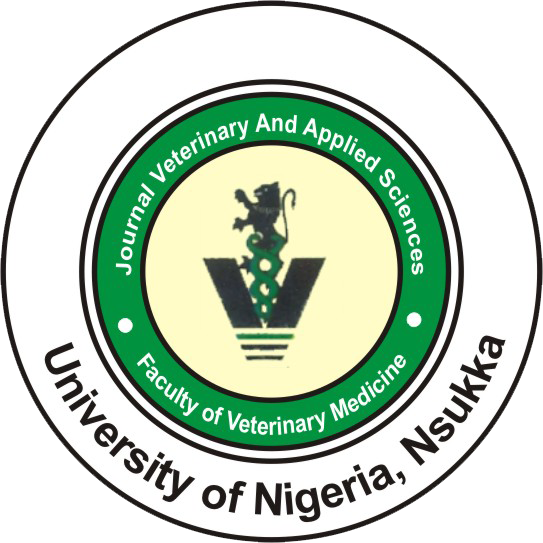University of Nigeria
ISSN: 2315 - 6856
e-ISSN: 2636 - 5553
Journal volumes
Powered by: RockSystems Global Services Ltd.
rocksystemsglobal@gmail.com (+2348035271306)
www.rocksystemsglobal.com
Volume 12: 2022 - Article IX
Abstract
The dry season in tropical regions of the world exerts thermal stress in poultry birds. This study investigated the modulatory effects of betaine and ascorbic acid supplementation on responses in follicle stimulating hormone, production parameters and immunity of Japanese quails (Coturnix coturnix japonica) during the dry season. A total of 372 fourteen day–old female quails purchased were kept in cages. Birds were assigned by Random design to 4 groups, each having 3 replicates; after 7 days of acclimation. There were 31 birds per replicate of each group. Experimental groups include birds fed Control (basal); ascorbic acid (AA) at 200 mg/Kg; betaine (BET) at 2 g/kg and combination of ascorbic acid; 200 mg/kg and betaine; 2 g/kg (AA+BET) diets. Serum malondialdhyde (MDA), superoxide dismutase (SOD), follicle stimulating hormone (FSH) and immunity of birds were assayed at 28, 49 and 70 day–age. Egg production parameters was assessed as hen–day rate (HDEP), egg mass, feed conversion efficiency to kilogram egg mass and a dozen egg produced. During the study, ambient temperature ranged from 25.0 – 37.0 °C; relative humidity, 63.0 – 91.0 % and temperature–humidity index, 75.6 – 91.0, predominantly exceeding the thermoneutral zone for Japanese quails. In comparison with quails of control group, AA and/or betaine lowered (P < 0.05) MDA, but enhanced (P < 0.05) SOD and FSH levels. Betaine increased (P < 0.05) HDEP, egg mass and feed conversion efficiency compared with control quails. Compared with control, AA, either alone or combined with betaine, decreased (P < 0.05) heterophil, monocyte, eosinophils and heterophil/lymphocyte ratio, but betaine lowered (P < 0.05) leukocyte and eosinophil numbers. In conclusion, betaine and ascorbic acid supplementations modulate responses in follicle stimulating hormone, egg production parameters and immunity of Japanese quails during the dry season.
Keywords: Antioxidants, Heat stress responses, Quails.
How to cite this article:
Egbuniwe IC and Uchendu CN (2022) Responses of follicle stimulating hormone, production parameters and immunity to betaine and ascorbic acid supplementation in Japanese quails during the dry season. Journal of Veterinary and Applied Sciences, 12: 58 – 75.

RESPONSES OF FOLLICLE STIMULATING HORMONE, PRODUCTION PARAMETERS AND IMMUNITY TO BETAINE AND ASCORBIC ACID SUPPLEMENTATION IN JAPANESE QUAILS DURING THE DRY SEASON
Ifeanyichukwu C. Egbuniwe1 and Chukwuka N. Uchendu2
1Department of Veterinary Physiology and Biochemistry, University of Benin, P.M.B. 1154, Benin City, Edo State, Nigeria.
2Department of Veterinary Physiology and Pharmacology, University of Nigeria, Nsukka, Enugu State, Nigeria.
Download .pdf copy here >>






